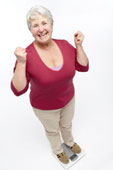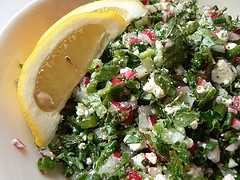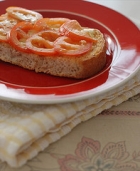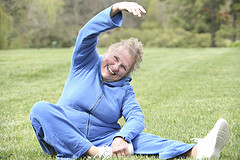Weight Loss With Aging

As you grow older, being overweight puts you at risk of a range of health problems including diabetes and hypertension. If you are overweight, changing your diet can significantly reduce your chances of illness (as well as raise your self-esteem). You do not have to go on a starvation diet to lose weight, but you do need to make long-term changes to your eating patterns by cutting out processed foods and full-fat products.

Consume Fewer Calories The rate at which you burn energy or calories – your metabolic rate – slows down as you get older (a calorie is the amount of heat needed to raise the temperature of 1 litre / 1 1/4 pints of water by one degree). You may find that continuing to eat the same amount that you did previously causes you to slowly gain weight. The way to lose weight is to consume fewer calories than you expend so that the body is forced to burn stored fat. Daily calorie requirements vary according to your lifestyle, but, as a rough guide, women need approximately 2000 calories per day and men need 2500. These figures increase if you have an active lifestyle. By eating 1000 calories less than these energy requirements each day, you should be able to achieve a steady weight loss of about 1 kg / 2 1/4 lbs a week, although the loss maybe higher at first due to fluid losses. It is not advisable to lose more than 1 kg / 2 1/4 lbs a week as you are likely to be losing fluid, and bone and muscle mass, all of which can accelerate the aging process. Many foods are labelled with their calorie contents, so it is easy to become familiar with the energy values of different foods. You should, however, try not to count calories obsessively.

Types Of Food:
The types of food that you should eat during a weight-loss diet are the same as those for a normal, well-balanced diet concentrate on complex carbohydrates and fresh fruit and vegetables. Avoid fatty foods especially saturated fats (found in meat, dairy products and coconut and palm oils). Remember that fats contain twice as many calories as carbohydrates and proteins.
1g carbohydrate = 4 calories
1g protein = 4 calories
1g fat = 9 calories
As well as eating low-fat foods, try to eat little and often. Start the day with a glass of warm (body temperature) water and a slice of lemon. Eat breakfast of wholegrains – such as wholemeal toast or muesli – half an hour after getting up. Avoid butter and use skimmed instead of full-fat milk. Snack on raw vegetables until lunch time and then make lunch the main meal of the day. Drink fruit juices, smoothies made with low-fat yogurt and herbal teas in the afternoon. Try to eat a light dinner a minimum of 3 hours before going to bed. Eat raw fruit whenever you feel hungry. Keep meals under 350 calories and allow 250 calories for drinks and snacks such as apples and carrots.

Tips For Losing Weight:
Before starting to diet, set yourself a target weight. If you are particularly overweight, you may want to decide this in conjunction with your doctor. If you are only slightly overweight, you may simply want to slim down until you can fit into a favourite item of clothing. If you have a lapse in your diet, do not see it as a reason to give up. Remember that you are only human. Avoid alcohol: not only is it high in calories, but research in Holland has found that people who drank alcohol half an hour before a meal are quicker and consumed more calories than those who remained alcohol free. Instead, drink a glass of water before a meal to help you feel full. Avoid using dieting aids or diuretics to assist weight loss, since they will upset the body’s natural balance, and can lead to problems such as vitamin deficiencies and digestive disorders. Combine your weight-loss diet with regular aerobic exercise. This will help to speed up fat loss and develop firm muscles. When you have reached your target weight, continue to eat sensibly. Try to keep meals to fewer than 500 calories so the body can break down each meal easily. This allows three meals of 500 calories as well as drinks and snacks of fruit.